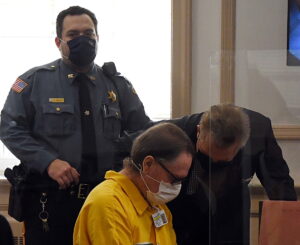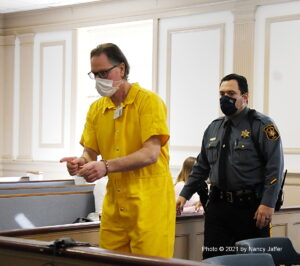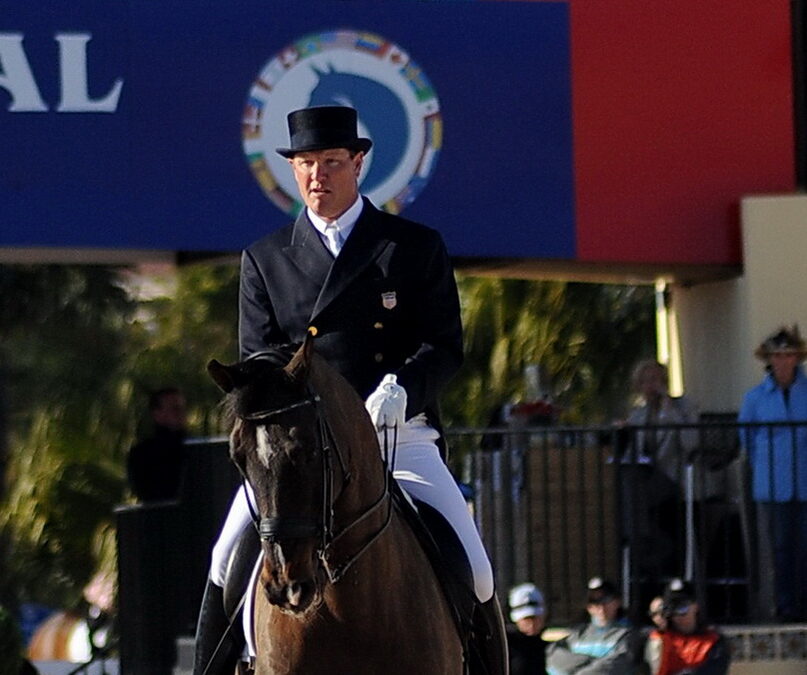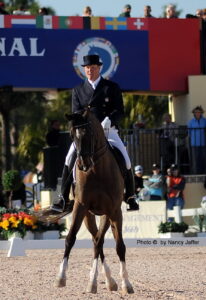Michael Barisone was “incoherent” after the Aug. 7, 2019 shooting for which he was charged with two counts of attempted murder, according to a Washington Township, N.J., police officer who responded to the scene.
Detective Derek Heymer recounted under oath during a Superior Court hearing in Morristown today that when he arrived at Barisone’s Long Valley horse farm on the afternoon of the incident, he found the 2008 Olympic dressage team alternate face down on the ground with Richard Goodwin on top of him, while Goodwin’s fiancé, Lauren Kanarek was nearby bleeding from chest wounds.
Heymer located the gun, a black and pink Ruger, underneath Barisone and threw it to one side and its empty ammunition magazine to the other. Barisone, who also was charged with possession of a firearm for an unlawful purpose, had blood on his face and a laceration on his forehead. He was talking to himself, according to Heymer, who reported the athlete had a blank stare and said several times, “I had a good life.”
Kanarek, a dressage rider, and Goodwin lived at Barisone’s farm, but he wanted them out because of what were called “escalating threats” involving fear of physical harm and property destruction, as alleged in a lawsuit filed in July against 11 Washington Township police officers and the municipality. A claim was made in the lawsuit that police did nothing to protect Barisone from the couple when he began calling 911 about the situation eight days before the shooting. Heymer was among the officers named in the suit, which eventually was dismissed.
Barisone’s attorney, Edward Bilinkas, said he plans to present evidence of insanity and self-defense in the case. In an interview outside of the courtroom, the lawyer said his client doesn’t remember anything about the shooting incident, blacking out from the time a representative of the state Division of Child Protection and Permanency began asking about accusations of abuse involving his girlfriend’s children, until he was hospitalized to be treated for his injuries. Following Barisone’s first court appearance in 2019, his former lawyer said that after Barisone tried to evict Kanarek and Goodwin, there was retaliation with the abuse allegations.

Michael Barisone confers in court with lawyer Ed Bilinkas. (Photo © 2021 by Nancy Jaffer)
The purpose of this morning’s session was for Judge Stephen Taylor to decide whether jurors should be permitted to hear testimony at trial about what police officers heard Barisone say when they were dealing with him after the shooting. Two other Washington Township policemen were questioned about that at a hearing in October.
Morris County Assistant Prosecutor Christopher Schellhorn pointed out that police did not cause Barisone to make the statements, which were not offered in response to questioning but were overheard and unrecorded. There was, he added, no risk those officers could have misheard or misunderstood the statements Barisone made. According to the police officers’ testimony, the statements included “Is this real? I need to wake up” and “They destroyed my life in the last six months, they took it all away. I’m sorry it happened.”
Schellhorn asked the judge to rule those statements should be admissible at trial.
Barisone, who has spent nearly two and a half years in the Morris County Correctional Center, came into the courtroom in handcuffs and was seated facing the judge. He did not speak publicly, but talked with his lawyer during the hearing. He was scheduled to be tried in February. But a pending murder trial for someone who has been in custody longer than Barisone will be occupying Schellhorn early in the year, so Barisone’s proceeding has been moved to March 21. Lawyers on both sides expect the trial will take two weeks for each of them to present their case, and dozens of witnesses will be involved, including psychological experts.
Discussing Barisone’s comments that were reported by the police officers, Schellhorn noted Bilinkas argued that these statements were related to the allegation of insanity.
“It certainly would be the defendant’s burden to produce evidence and establish he was insane by a preponderance of the evidence,” said Schellhorn.
Bilinkas pointed out that his client had been beaten and was described in testimony as “incoherent” and “dazed” in the wake of the shooting. He contended that the comment, “Is this real” was “an indication he doesn’t understand…what he’s saying. Those statements indicate someone who’s struggling with, I submit, reality.”

Michael Barisone leaving the courtroom today. (Photo © 2021 by Nancy Jaffer)
In response, Judge Taylor asked, “Is that a question for the court now or perhaps one for the jury?”
Bilinkas explained, citing his client’s trauma and head injury, “He didn’t realize what he was doing, what was going on. To make any type of statement, the court needs to make a determination, at least initially, as to whether or not it’s at all reliable and voluntary under the circumstances.”
The lawyer said some of the statements were made after Barisone received large amounts of narcotics in the hospital, maintaining it was mind-altering. The judge asked how he was supposed to know “what the pharmacological effects of fentanyl is a minute later?”
Bilinkas suggested the judge could use his “common sense,” but the judge said that assertion is subject to medical testimony.
“When you’re telling me it alters his mind, I don’t know that, I don’t have any evidence before me, medical records or other records, to indicate what the effect is on an individual,” the judge said.
Bilinkas responded, “He doesn’t know what’s real, he doesn’t remember the incident.” He added that should weigh heavily in regard to the court’s “initial determination as to whether or not the statements should be admissible.”
The judge said he would take the issue under advisement and issue a written opinion.





